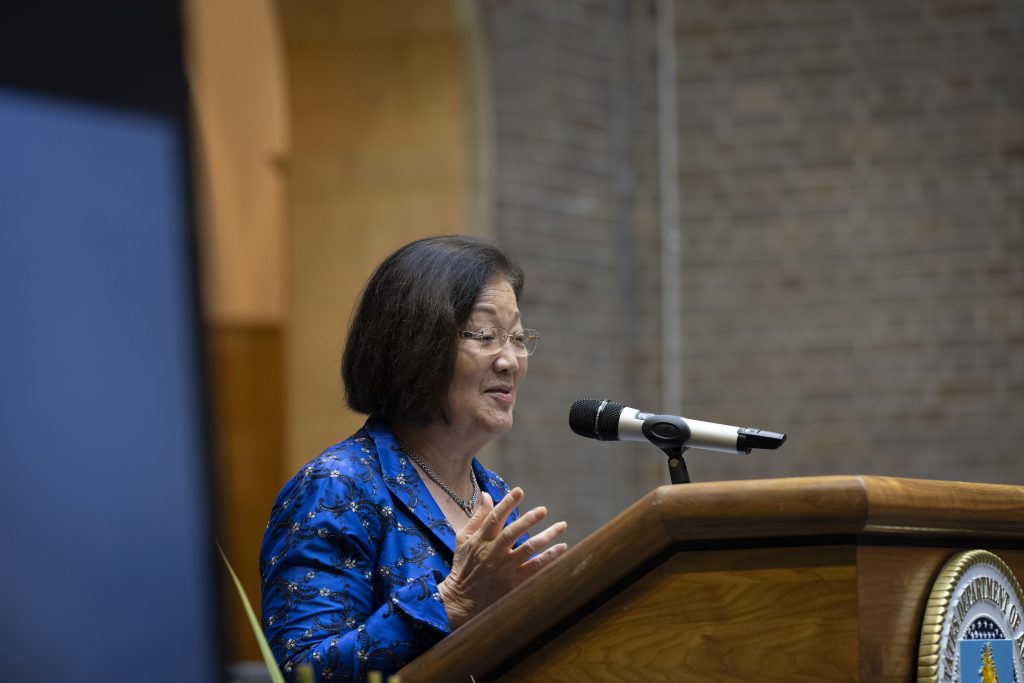Proposed law aims to correct citizenship oversight for adoptees
New legislation could grant U.S. citizenship to international adoptees who were legally adopted in the U.S. as children.
U.S. Sens. Mazie K. Hirono and Susan Collins, along with Reps. Adam Smith and Don Bacon, introduced the Protect Adoptees and American Families Act to remedy a loophole in the Child Citizenship Act of 2000 and make it easier for families to gain U.S. citizenship for international adoptees.

“Thousands of American families and their internationally adopted children have been living in fear and uncertainty due to an oversight in the Child Citizenship Act, which is why I’m proud to join my colleagues in introducing legislation that would provide a long overdue solution to address this issue,” Hirono said.
Families who adopted children from abroad were previously required to complete a lengthy, expensive naturalization process for their adopted children, on top of the adoption process itself. In some cases, the paperwork was not completed in full, leaving adoptees unaware they were living in the U.S. without citizenship.
The Child Citizenship Act of 2000 streamlined this process by granting automatic citizenship to foreign-born children under age 18 adopted by U.S. citizens. However, the law only applied to adoptees under 18 at the time the act took effect in February 2001. Adoptees who had already reached adulthood were excluded, leaving tens of thousands of people without citizenship despite being raised in American families.
Several organizations such as the Korean American Grassroots Conference (KAGC), the largest nationwide network of Korean American voters, the National Korean American Service and Education Consortium, and the National Asian Pacific American Bar Association expressed support for the bipartisan measure, citing that the majority of adoptees without citizenship arrived from Asian countries.
“We recognize the challenges faced by adoptees who, though raised in American families and contributing fully to our communities, continue to live without the protections of citizenship,” said Wonseok Song, executive director of the Korean American Grassroots Conference. “With Korean American adoptees among the most affected, KAGC is committed to working with partners to ensure this vital legislation is enacted and justice is delivered to all impacted.”
Fundamental fairness demands that those children who were lawfully adopted and raised in the U.S. enjoy the full privileges and opportunities of American life,” said Priya Purandare, executive director of the National Asian Pacific American Bar Association. “Yet for thousands of international adoptees, so many of whom arrived from Asian countries and through no fault of their own, that basic promise has been denied due to inadvertent missing paperwork.”
“Congress intended citizenship for children being internationally adopted by American citizens, but a complicated and confusing immigration and visa system resulted in some parents failing to complete the citizenship process on behalf of their minor children,” said Ryan Hanlon from the National Council for Adoption. “The Protect Adoptees and American Families Act provides the citizenship that was initially intended for these individuals.”
The Protect Adoptees and American Families Act fixes the oversight from the Child Citizenship Act by confirming U.S. citizenship for internationally adopted individuals, regardless of when they were adopted or their age. Specifically, the bill:
- Provides automatic citizenship to foreign-born children lawfully adopted by U.S. families who turned 18 before February 27, 2001;
- Establishes a path to citizenship for adoptees living abroad who meet eligibility requirements but currently reside outside the U.S. This process includes background checks and the resolution of any outstanding legal matters before citizenship is granted.
This legislation will provide long-overdue certainty for adoptees who have faced barriers to higher education, employment, and financial services, and who in some cases have even faced deportation to countries where they have no family or community ties.
“Adoptees and their families across the country are living in fear, shock, and with a sense of betrayal—often learning they are not citizens when they are well into adulthood and after lifetimes as Americans,” said Rachel Koelzer, co-founder of Adoptees For Justice. “More and more adoptees are reaching out when they are approaching or in their senior years. Their stories underscore the urgent need for immediate legislative repair.”
According to Amanda Cho, policy manager with the Alliance for Adoptee Citizenship, this is the 10th year the bill has been introduced.
“We’re thrilled at the introduction of this bill that will give aging adoptees the rights and protections that are rightfully theirs,” Cho said. “Reintroducing this bill is an important step toward ensuring that no one is denied their rights or opportunities because of how they came to be a part of their families.”
The 25-year loophole has caused many adoptees living as citizens with Social Security numbers and driver’s licenses to be deported to a country where they do not know the language, know no one, and don’t have means to make a living.
“To be adopted into a family is to be chosen, loved, and embraced as one of their own. Adoption is a bond that transcends borders, making you not just a citizen of a country, but a citizen of a family, forever,” said H, an adoptee without citizenship. “Somehow, we as adoptees have been forgotten. We were lost in the shuffle and are being held accountable for the responsibilities of adults that were ignorant of the process.”
“Our adoptive parents were under the impression that we were citizens through the adoption process,” they continued. “Many of us were born in the ’60s and grew up living as citizens because we were told we were. Why would we believe any different when we grew up being told we were citizens?”
The bill has been endorsed by the Adoptee Rights Campaign, Korean American Grassroots Conference, National Council for Adoption, Ethics and Religious Liberty Commission, NAKASEC, Niskanen Center, Center for Adoption Policy, National Immigration Forum, National Asian Pacific American Bar Association, Adoptees for Justice, Family Coalition for Adoptee Citizenship, National Alliance for Adoptee Equality, and Alliance for Adoptee Citizenship.
The full text of the legislation is available here.
.



